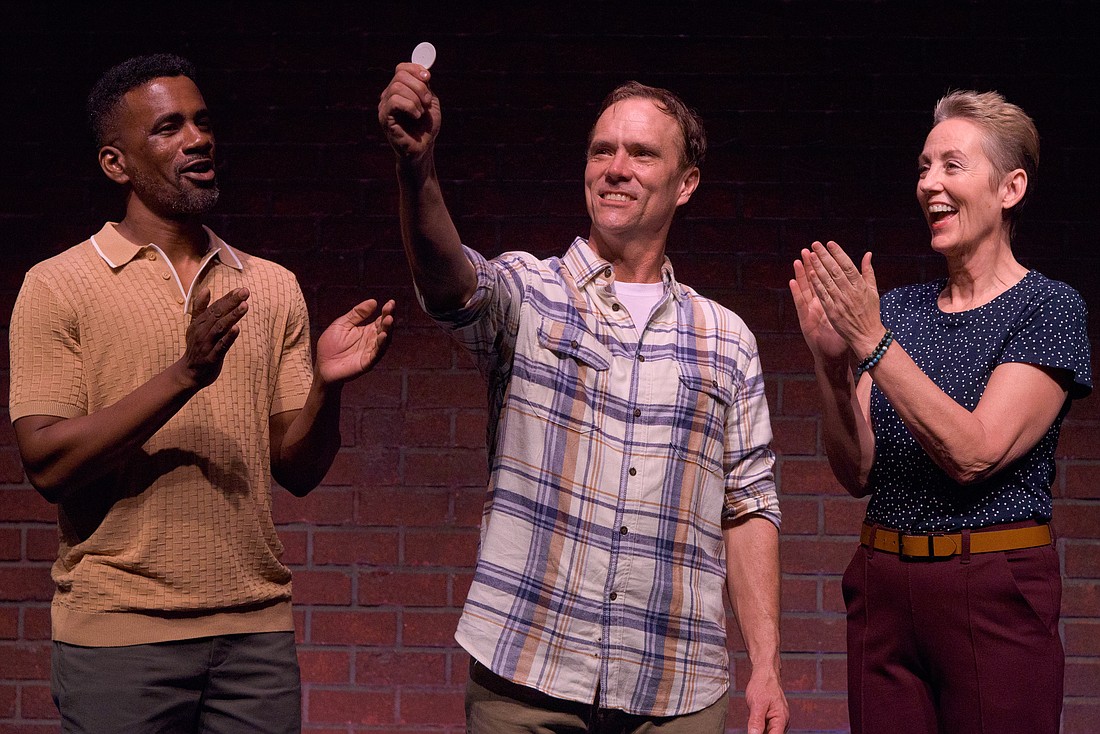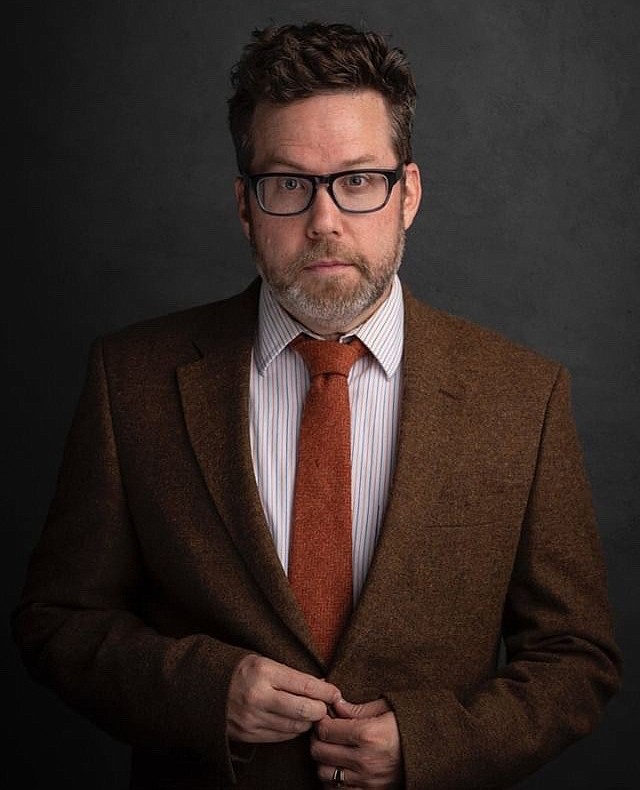- November 5, 2025
-
-
Loading

Loading

Learning how to navigate life successfully without using mood- or mind-altering substances is the core challenge for anyone seeking recovery from addiction — whether through a 12-step program or not. For performing artists, however, there’s an added twist: Many elements of the profession’s lifestyle are directly at odds with getting and staying sober.
And, as any recovering addict (this writer included) has learned, “If the drugs don’t kill you, the lifestyle will.”
While this saying typically refers to the risky situations and questionable behaviors many addicts engage in to get more of their substance of choice, it’s doubly true for performing artists. Sean Daniels, director of Florida Studio Theatre’s The Recovery Project and the Anti-Stigma director at Live Tampa Bay, knows this firsthand.
In his autobiographical comedy, “The White Chip," which ran earlier this year at FST and returned to Off Broadway in New York City in February, Daniels fictionalizes his own descent into addiction and his eventual recovery. The title refers to the token given to addicts at 12-step meetings who want to stop drinking or taking drugs.
Through this work, Daniels sheds light on stumbling blocks specific to artists, including the belief that drinking is essential for creativity, and is an accepted part of navigating the social demands of theatrical success.
“Going out after a show, attending opening night parties and being present at donor events where alcohol flows freely are all part of the job,” says Casey Murphy, a Sarasota-based actor with 12 years clean and a supporter of The Recovery Project. Murphy adds that income instability and a culture in the arts that glamorizes drug use and drinking further hinder an artist’s path to recovery.

Moreover, the nature of stage work exacerbates the problem. Actors and directors, like Daniels, often work nights — performing eight shows a week, with the expectation of being emotionally open and at their best every night at 9:45. That’s a tall order if you’re battling addiction.
“Being an actor is emotionally and physically draining, but the mindset is to ‘just power through it, no matter what,’” says Daniels. "Those suffering from a disease like diabetes or asthma know that ‘powering through’ could be deadly, so they seek help. With addiction, though, there’s a stigma around asking for help, so you might end up trying to handle it on your own —and that’s the trap."
The isolation that comes with the profession can also be a trigger. “Let’s say you live in New York or elsewhere and get hired by a regional theater. You’re now spending two months in a community far from your friends, family and doctors,” Daniels explains. Isolation and addiction are known to be destructive bedfellows, echoing another recovery truism: “An addict alone is in bad company.”
Despite these challenges, The Recovery Project has made significant strides since its inception nearly two years ago. The program has introduced key initiatives like new play commissions, educational resources, artist workshops and a help line for artists. Yet, the overarching mission remains ongoing: to transform the narrative, break the stigma surrounding addiction and ultimately save lives.
One of The Recovery Project’s standout features is its "warm" line, designed specifically for artists who may be struggling or have questions, but are not necessarily in "hotline" crisis.
“When an artist calls the warm line, they’re connected to peers or local resources through our partnership with Lightshare in Sarasota. It doesn’t require insurance and is designed to be accessible and supportive,” says Daniels.
Karina Clarke, vice president of operations at Lightshare, played a pivotal role in developing this service. Before joining Lightshare two-and-a-half years ago, Clarke was program director of Sarasota County’s Drug Court for 18 years under 12th Judicial Circuit Court Judge Charles E. Williams. “Judge Williams, who is heavily involved in Sarasota’s artistic community, introduced me to this project,” she confirms.
Clarke explains that the warm line operates like a concierge service for artists, assessing their struggles and connecting them with the appropriate services. This can include screening for residential facilities, immediate detox placement, mental health crisis intervention, outpatient services and peer support. It’s also available to family members seeking guidance.
“By creating a supportive environment, Lightshare aims to make it easier for artists, who often face unique challenges, to ask for and receive help without shame,” says Clarke. The ultimate goal, which aligns with The Recovery Project, is “to educate and reduce the stigma associated with addiction, ensuring individuals are treated with respect and have access to necessary services without bureaucratic hurdles.”
A common misconception about and among artists is that the substance use fuels creativity. Daniels calls this “the myth of the artist who sacrifices himself for supposed genius,” and Murphy adds, “the notion of the wildly talented but self-destructive artist is just that — a myth."
Playwright Jake Brasch is living proof that this myth is untrue. He didn’t begin writing his award-winning plays until after he got sober. “That’s when I realized my way to process the world was through writing and comedy,” he says.

He also discovered that the shared experience of addiction, while painful, could be funny. “Recovery spaces are the best theater on earth,” says Brasch, reflecting another recovery truism: “If you're not laughing in recovery, you're not doing it right.”
Brasch first connected with Daniels in 2022 and held a workshop based on his play, “How to Draw a Triangle” at FST in April. He related to The Recovery Project’s “mission to reach people through stories about addicts or people affected by addiction (because it) aligns with my central mission as an artist — to reach other artists in our profession who are struggling.”
Daniels adds, “Casey and Jake are two sober artists I first encountered and wanted to support. They’re both incredibly talented, smart, open about their sobriety and game to help me save a few lives — especially those who are wondering if they should give sobriety a shot or are in early sobriety.”
Brasch emphasizes the power of storytelling in recovery. “Before I got sober, no one could tell me what was happening until it was too late. Stories have a different potential to advocate compared to usual methods. Being able to get people to say, ‘me too,’ is a big moment for recovery. Seeing someone else go through it, or showing someone going through something that mirrors their life, is my ethos around writing recovery stories. It’s not about finger-wagging; it’s about saying, ‘Come on in.’”
Helping artists struggling with addiction connect with peers and find the help they need is vital, but The Recovery Project has further ambitions.
“We measure success through surveys, feedback, and the impact of our educational and support initiatives," says Daniels. The most recent Anti-Stigma report shows that it’s working.
The community is responding to The Recovery Project’s storytelling, says Daniels. “Seeing and hearing stories that people relate and respond to can not only change national narratives, but can reduce stigma, which helps people to seek care, which ultimately saves lives.”
As for advice for performing artists struggling with substances, Daniels says, “I would tell you it’s better on the other end. I have a wife and a daughter who have never seen me drink!”
“Many artists and writers did their best work despite addiction, not because of it,” notes Murphy, adding, “the experience of getting sober humbled me and made me better on stage.”
Brasch offers these encouraging words: “allow yourself to express as freely and openly as you can. Dance, write, sing — not to promote, but to process what’s happening to you artistically. It will help you understand how to recover, rebuild and realize what matters most to you.”
You can learn more about The Recovery Project at SeanDDaniels.com. The warm line can be reached at (883) OKIQUIT (654-7848).